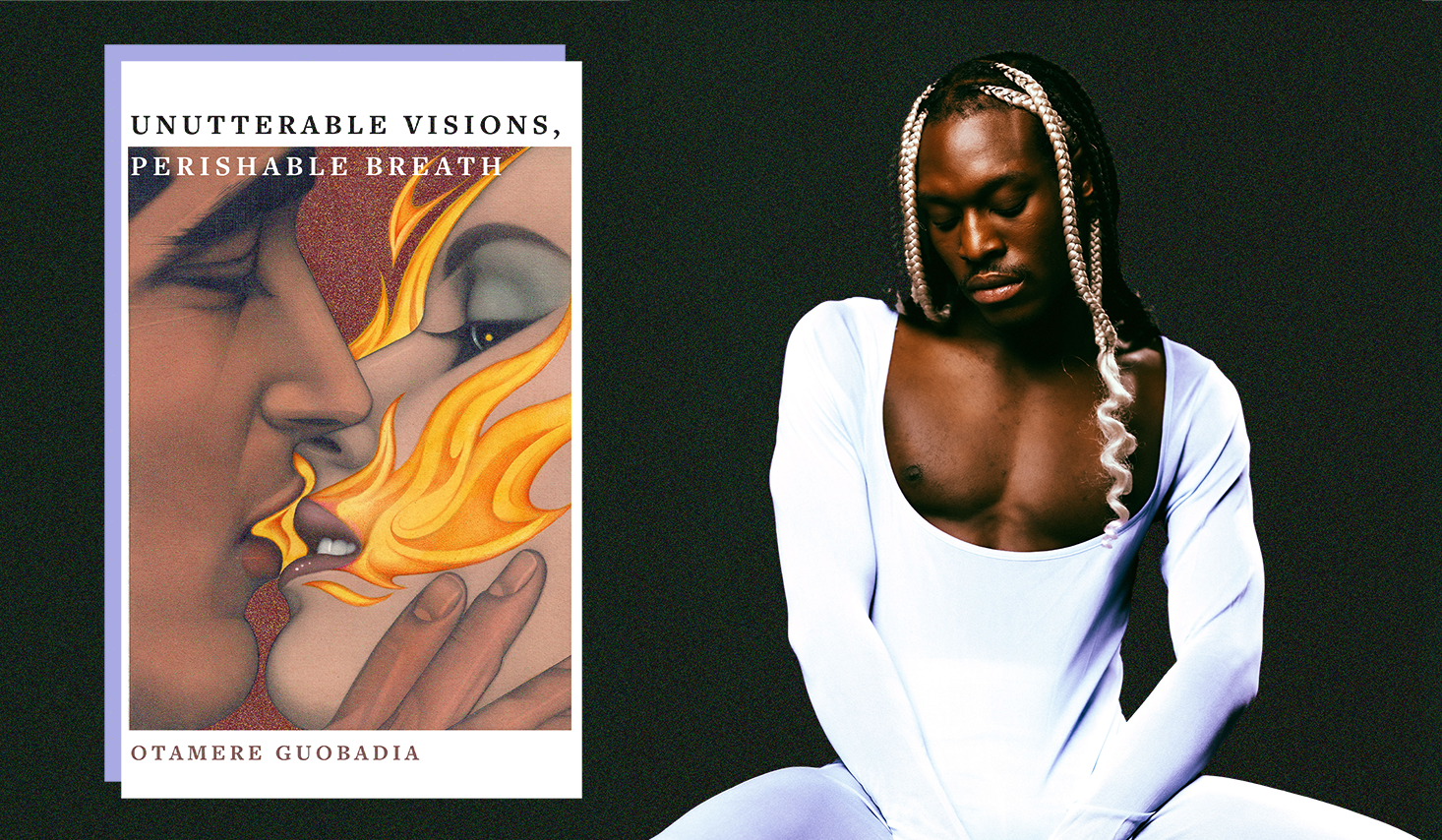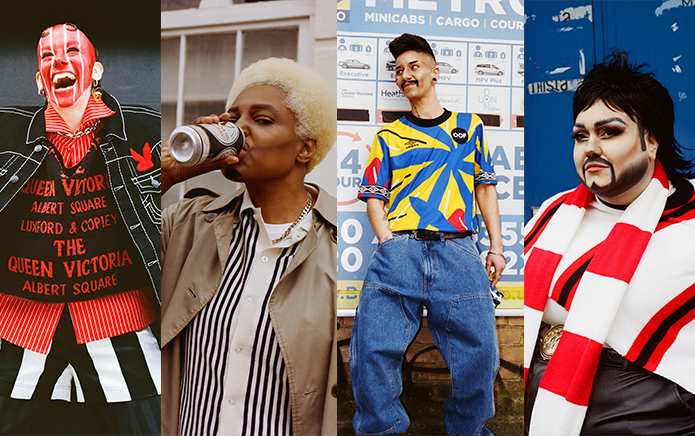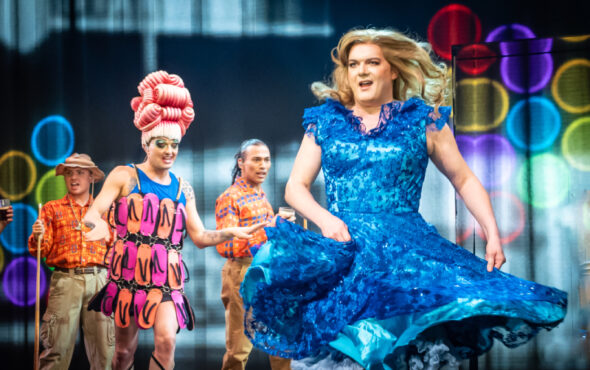
“These words are my salves. Bandages on damnation,” Guobadia proclaims in the introductory pages of Unutterable Visions, Perishable Breath. In his debut poetry collection, Guobadia’s lyrical sequences and fragmented queer poetry reflect on themes of yearning, destiny and personal history.
A multi-hyphenate writer, Guobadia’s journalistic work has appeared in British Vogue, The Guardian, GQ and much more. In recent years, he has written passionately on topics of queerness, love and creativity. Unutterable Visions, Perishable Breath marks a change of direction in his creative form.
Inspired, if in title only, by The Great Gatsby, the writings within Unutterable Visions, Perishable Breath probes the complexities of desire and “the things we cannot define”. Across 85 vibrant pages, Guobadia unravels stories of heartbreak, delivers heartfelt odes to the women who made him and enumerates a list of lovers who changed his perspective on love and intimacy.
As the collection progresses, Guobadia not only leads us not only through his own expressions of intense emotion but turns his gaze outwards to the cosmos, creating a captivating record of “love in bones and air and stars”.
To mark the publication of this provocative debut, Guobadia spoke to GAY TIMES about taking inspiration from Ancient Greece, spilling the “uncurated mind” onto his pages and his love for poet Mary Oliver.
Otamere, congratulations on your debut publication! How did Unutterable Visions, Perishable Breath come about?
Thank you! Unutterable Visions, Perishable Breath has been many moons in the making. The oldest poems and phrases in it I wrote as early as a decade ago, and some of the work is as recent as this summer. It was initially for a long time a kind of sprawling unfocused personal anthology called ‘Thoughts on A Body Too Long Curated’—and its origins still echo throughout the work. It has undergone a great deal of iteration and transformation over the years, and in the last few was stripped back into a much more archetypical poetry book. But the core of it remains unchanged – its aim, if I can claim such a thing, is to paint a broad and honest portrait of my life. To show the truth of a mind—racing, circuitous, stumbling, lovestruck, mired in both the rot and the varnish.
When did you first start writing poetry?
There are some early attempts at writing poetry, but I wrote prose mostly before I meaningfully engaged in trying to write only. Only in the last few years has the title of poet felt like one I have any right to and even then, it’s been a process of shedding self-consciousness, about the medium, myself, and about my ability. Now I write poetry because it makes me legible – if perhaps to no one truly but myself.
Who has been the most impactful author or poet to you and why?
Mary Oliver. Her deep and sincere adoration of the natural world charms me every time and makes me want to go out in the world. She provides such a thrilling and simple blueprint for living in our present moment, how to love this world and let go of it. Unburdening yourself is the work of a lifetime. No half measures.
Your collection is structured according to Hippocrates’ four humours. What inspired you to organise the poems into those categories?
There is something both deeply facile and deeply satisfying about the ancient idea that wellness, illness, moods and temperament are dictated by our humours – our deficiency or excess of them. I chose them for their mysticism, and because like minds they are frenzied and constantly in flux. My words here mingle, then transmute. they begin as one thing and end as another.
View this post on Instagram
The title of your collection is taken from a line in The Great Gatsby. What was it about the original quote that appealed to you?
“He knew that when he kissed this girl and forever wed his unutterable visions to her perishable breath, his mind would never romp again like the mind of God.” There is a shining moment of intimacy at the heart of a good kiss – a farewell to arms, both parties investing in the other, for this moment, as a site of miracles. Much of what we feel deeply is nearly impossible to put into words. I too have a mind that romps—I hope love makes it into something greater.
In your dedication, you honour the women in your life: “I am not often the best version of myself, but on the days that I am it is because of you.” This sentiment is mirrored in ILÉ-IFẸ̀ too. Can you share a lesson that you have learned from the women closest to you?
That kindness – unfettered, shown with no expectation of reciprocity – is grace. And we are compelled to show each other grace.
Unutterable Visions is powerful in the way it brings together stories of trauma, queerness, desire and more. Who have been the poets that inspire you in these areas?
Anne Carson, Essex Hemphill, Jericho Brown.
Can you name a poet that our audience should read?
Mary Oliver.
View this post on Instagram
You pool together numbered fragments and poetic sequences throughout Unutterable Visions and play around with different forms. How did you decide on your chosen styles?
Minds are lateral indiscreet things, not easily quietened nor arranged into boxes. Our bodies are not sites of coherence, laid out in perfect paragraphs, and I wanted both the form and the content to play with the notion of an uncurated mind, the mind as it is, unfiltered.
Your poetic entries prompt readers to feel things as they are happening – or as they are created. How does the imagination of endings play into your writing?
Beginnings are the brightest spots. I can no longer afford to live in the subjunctive. Nothing is certain, nothing not on fire. I am always looking for new beginnings, preoccupied with undying things – Endings are often bitter, perhaps more often than they are not.
What was the most surprising influence (book, movie, music) that had some creative impact on this collection?
Catholicism – with its pomp, mortification, and mysticism.
Lastly, what are you going to read next?
I’m currently reading Rousseau’s A Discourse on Inequality, and I’m hoping to read Revelations of Divine Love by Julian of Norwich
Unutterable Visions, Perishable Breath is out now, via Broken Sleep Books, and available to buy here.



